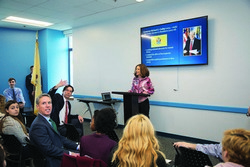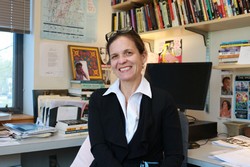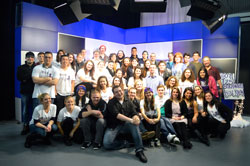Johanna Foster, Ph.D., will assume her role as the Faculty Association of Monmouth University (FAMCO) President this July.
Foster is the Helen McMurray Bennett Endowed Chair of Social Ethics and an associate professor of sociology, and has been actively involved with FAMCO since coming to Monmouth in 2003.
The following questions and answers are from an email exchange that took place from Friday, March 19 to Sunday, March 21:
Have you always aspired to be the faculty union president?
“[I] have been continuously involved in social justice movements in some shape or form for 30 years now. I first got involved in feminist movement organizing as a Women’s Studies major in college back in the 1980s, and those experiences inspired me to seek a professional career where I could continue to be part of collective struggles for equity and justice. That aspiration to be among those fighting to do the right thing is actually what got me into the field of Sociology. It hit me in college that in order to really confront exploitation and inequality, whether it’s labor exploitation or any other manifestation of injustice, you can’t just change individual people, but also have to work to change the systems. Since college, I’ve consistently been connected to gender justice movements, as well as racial and economic justice work, which are all interrelated.
This latest opportunity to serve as President of the MU Faculty Association for the next three years is truly a high point for me in that work. I cannot tell you how excited I am to be working together with all of the members of our faculty, as well as our students, to protect the rights of professors to do what they do best: inspire and critically challenge students in their areas of expertise so that students can find their own paths in the world in ways that feel right for them.”
What does a change in leadership mean for the university community?
“I think the change in union leadership signals a deepening and widening concern among many of our faculty about persistent problems in higher education overall, and more importantly, increasing faculty concern that those disturbing national trends have made their way to our campus
I also think any change in union leadership affords all of the faculty the chance to consider and appreciate the power and responsibility of an academic union, especially at a time when the mission and values of higher education are being coopted at every turn.
It is also a chance for professors, students, and administrators alike to remember that professors join academic unions not only to fight for better salaries and benefits, which is key to any union, but to fundamentally protect the central role and power of the professoriate such that the university, itself, and our students, do not become targets of anti-democratic sentiment or predatory government and commercial interests.”
How would you describe your relationship with the faculty?
“Personally, I have had the honor of working with many of our faculty since I first came to Monmouth over 15 years ago. In my experience, our faculty includes some of the most dedicated and inspiring teachers and researchers out there, and I feel grateful to be able to work with them each day.
It is also my opinion that our faculty are the heart of our academic community, and because of that, many of us are totally alarmed by the diminishing power and professional respect afforded to our faculty on this campus, as well as the disturbing obstacles that our administration has steadily erected over the past five years or so that seriously challenge our ability to deliver the high quality education that our students deserve.”
Are there issues you believe need to be addressed? What things do you hope to keep, change, or improve upon?
“In general, faculty around the country are organizing around stagnant professor salaries; persistent racial and gender disparities in professor earnings and promotions; unjustified tuition hikes; crushing healthcare costs; overreliance and exploitation of contingent and adjunct faculty; the reckless spending, unjust enrichment, and corruption among university administrators; and the overall threats to academic freedom and shared governance posed by grossly-expanding university administrations that aim to usurp the autonomy of faculty. I think it will be important for FAMCO to continue to assess the extent to which our campus is plagued by these national patterns as well.
We already know that many FAMCO union members strongly object to the excessive salaries paid to University administrators at a time when our students are being subjected to questionable tuition increases, and our professors are taking what will amount to a three year pay cut considering cost of living adjustments. On top of that, the new faculty contract allows current professors to “choose” from two healthcare plans for themselves and their families: one that requires them to pay obscenely high prices for quality healthcare and another that is admittedly more affordable but offers an unconscionable level of limited coverage. All new faculty will have no choice but to accept the limited coverage plan.
Again, what is happening overall to our faculty and to our students, is not unusual, but part of a much larger and chilling trend in higher education over the past few decades widely understood as the rise of ‘academic capitalism,’ or the ‘corporatization of higher education,’ which essentially means the hijacking of universities for commercial gain. With that comes the transformation of the university into a business where faculty are treated as corporate workers to be managed and controlled, and students treated largely as consumers from whom tuition and other resources are also to be extracted.”
What excites you most about this new position?
“I am excited to be joining a great Executive Committee of FAMCO officers that includes both professors who have already been serving us well in leadership capacities and new leaders who are bringing additional expertise, including expertise in institutional financial analysis and critique, and expertise in the predatory dimensions of the student debt crisis.
I’m also really heartened that all around the nation, including right here in New Jersey, faculty and students alike are waking up to reality of what has been happening on our campuses, and are increasingly disgusted with the flagrant attacks against the mission of higher education. I see this positive energy here at the University as well, and have been inspired by my colleagues and our students who know that just because this is a national trend, it doesn’t mean we have to accept it as our fate here at Monmouth.
I am also looking forward to representing the shared concerns of our FAMCO membership with our new president, Dr. Leahy, in the months ahead. It is time that our persistent concerns about an outsized administration, an undervalued faculty, and an overcharged student population, among other issues, are heard and taken seriously.”
Is there anything else you want the Monmouth community to know?
“I really want to emphasize that it is important for people to understand why faculty unions are so important in the first place. A union not only allows us to fight for better salaries and benefits, but it also protects professors so that they, the university, and our students, do not become targets of anti-democratic sentiment or predatory government and commercial interests.
A strong faculty union is obviously good for faculty, but it is also good for students. The more power faculty have to protect their primary role as expert educators at the university, the better they can protect students from the troubling encroachment of predatory actors and institutions onto their campus, into their classrooms, and into their families’ bank accounts.”
PHOTO TAKEN by Nicole Riddle
PHOTO COURTESTY of Monmouth University




